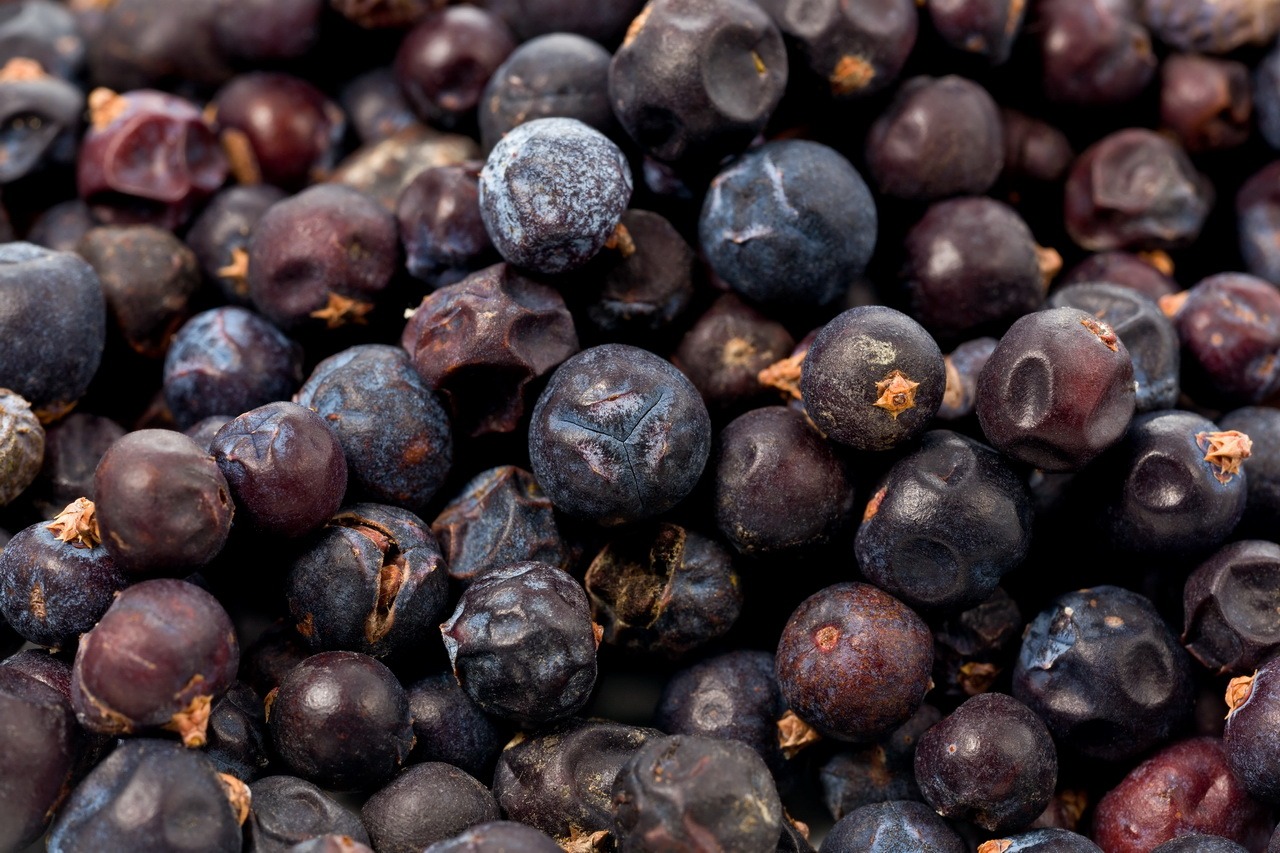Juniper (botanical name – common juniper) is an evergreen plant of the cypress family. For the production of CO2 extract, as well as other products from juniper, including pharmaceutical substances, the berry-shaped female cones, often referred to as berries, are used. Dry juniper wood is also used in its manufacture, from which brown and red food colorings are obtained. An aromatic resin is obtained from the resin – sandarak, which is used for incense, in the manufacture of artificial varnish, in dentistry and in embalming.
The main property of common juniper, due to which it is used in traditional and official medicine, is volatile (this means that it actively sterilizes all products to which it is added). Products made from the cones, pine needles and juniper wood also have a pronounced distracting and analgesic effect. In addition, juniper-based products are used as a diuretic, expectorant, choleretic and digestive. As a disinfectant, juniper extracts are used to treat trichomonas vaginitis. In products for external use, juniper is used to treat gout, rheumatism, polyarthritis, gingivitis, tear worms and scabies. It turns out to be an effective anti-allergen.
In food production, juniper berries are used to make gin and juniper vodka. Infusions from umbellifers are used in the preparation of sauces for meat, game, cabbage salads and in the manufacture of confectionery. Greens and wood with cones berries are used in smoke production.
Concentrated 100% CO2 Juniper Extract (Item A100) is a brownish, oily liquid with a very pronounced needle-like, sweetish aroma and bitter taste. With strong dilution, the aroma becomes softer and corresponds to the smell of fresh juniper greens.

Chart 1. Main components of juniper CO2 extract
| NAME | CONTENT IN% OF THE AMOUNT OF VOLATILE COMPONENTS | EFFECT |
|---|---|---|
| α-pinene | 23 | Easily penetrates the epidermis and irritates the nerve endings, causing an intense blood rush. Causes expectorant effects. |
| Myrcene | 14 | Sedative. Used in perfumery. |
| Germacren-D | 9,7 | Expectorant, antiallergenic. |
| Sabinen | 5,7 | Stimulant, anthelmintic, antimicrobial. |
| β-Carryophyllene | 2,9 | Used in perfume compositions, fragrances for soaps and cosmetics. |
| Limonene | 2,4 | Effective against fungus, mold and bacteria. perfume fragrance. An effective repellent. Undesirable in cosmetic preparations for sensitive and allergic skin. |
| β element | 2,4 | Anticarcinogen, anti-inflammatory, immunomodulatory. |
| β-Cedrene | 2,3 | Repellent, volatile, antibacterial. |
| Elixen | 2,2 | Antibacterial, promotes better distribution of creams on the skin. |
| Manool | 0,4 | Antimicrobial and antiviral activity. |
In total, more than 50 compounds with biological activity have been identified in the CO2 extract of common juniper.
In cosmetics, juniper CO2 extract is valued as a product suitable for all skin types:
- to moisturize the skin and reduce swelling
- to smooth, increase firmness and elasticity of the skin
- to clean and reduce enlarged pores
- as an anti-acne remedy and supplement
- as an additive in lip care products with an anti-herpes healing effect
- as an additive in hair care products that promote hair growth
- as an anti-cellulite supplement
CO2 extract from juniper can be used in a concentrated form, in the form of oil solutions, as well as in the form of microemulsions that form optically transparent pseudo-solutions in water and water-alcohol solutions.
Juniper CO2 extract microemulsions are widely used in the production of lemonades (non-alcoholic carbonated drinks) and become one of the most versatile ingredients for products of this type, which can be used both as a main flavor and as an arbitrary shade. They have a light and pleasant taste with a needle note.
Microemulsions of CO2 extract from juniper are also used in the production of dark beers, to which they give a characteristic taste and evoke associations with stronger alcohols.
Another rapidly developing area of application for juniper CO2 extract microemulsions is the production of marinades based on them for tart-tasting and relatively exotic types of meat (deer, wild boar), poultry (ducks, turkeys) and especially game.
Interesting results have been obtained using microemulsions of juniper CO2 extract in ice cream. Juniper fillings for sweets and chocolate dragees were also popular, for which microemulsions turned out to be cheaper than CO2 extracts in the original fat-soluble form for a number of reasons.
Also worth noting is the prospect of using juniper CO2 extract (both in native lipophilic form and in water-soluble microemulsion form) in oral care products – toothpastes and rinses. Due to its disinfecting properties, juniper extract fights all types of harmful microflora, prevents the development of oral diseases and helps maintain a pleasant freshness of breath throughout the day, i.e. it also acts as an effective long-lasting deodorant.
Another promising area of application of juniper CO2 extract is the production of various types of functional foods, which primarily have sterilizing and analgesic properties, as well as a number of other beneficial properties. The prospects for using juniper CO2 extract in this direction are determined by several reasons: firstly, this extract has really pronounced functional properties; Secondly, juniper is a plant that is well known to most consumers and does not scare them at all, and thirdly, juniper-based products with a properly formulated recipe and properly selected excipients will also be tasty. This is often crucial to the success of the product (because a tasty and healthy product sells much better than a healthy but tasteless product).
Chart 2. Application amounts, recommendations for use and storage of juniper CO2 extract
| Food usage rates | Item A100: 0.002% (20 g per ton) Water-soluble microemulsions EMA1: 0.1% (1 l per 1000 l or 1 ml per liter) |
| Application rates in cosmetics | Item А10: 1-3% Item А100: 0.1-0.3% |
| Recommendations for use | It is recommended to add CO2 extracts in the final stages of preparation, in the cooling phase of the end product. |
| Storage Instructions | It is recommended to store CO2 extracts in a closed container in a cool room and avoid direct sunlight. |
Historical reference

The tradition of using juniper in Russian lands has a very long history. It is mainly associated with the use of the disinfectant properties of this plant, which our ancestors knew literally from time immemorial – juniper was fumigated at home, it was used to disinfect dishes and barrels. Juniper brooms were often used in baths along with birch brooms. Juniper has also been used medicinally, for coughs, and to treat gastrointestinal disorders.
The demand for juniper was so great that at one time in Russia there was even a special “berry tax” – juniper berries had to be brought to Moscow from all regions of the country, where several types of products were made from them, which were considered especially valuable, including one drink called “Royal Most” which kings drank during fasting.